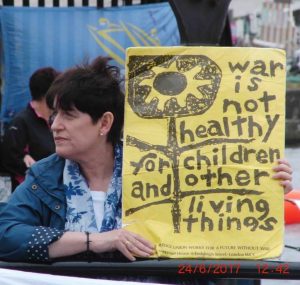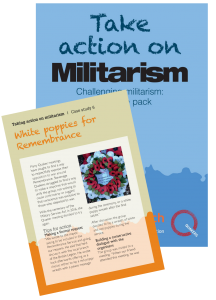Media coverage – whether that be on radio, TV, newspapers, social media, either locally or nationally – is a vital way of creating and informing public debate and influencing policy and practice. A council that has received criticism for allowing weapons on display at a recruiting stand is more likely to reconsider next time. Parliamentary representatives use the media to stay informed about their constituents’ concerns.
The media plays a huge role in increasing the influence of the armed forces in society. Parts of the media have actively campaigned to this effect while other parts largely report public events such as Armed Forces Day, or policy decisions which favour the military, with little balance.
By challenging media bias and introducing other perspectives, we help to change what is regarded as mainstream public opinion and create more balanced debate. As a result of sustained work by campaigners, the campaign to raise the age of armed forces recruitment is now recognised within the media and is regularly the subject of interviews or talk-shows.
With the diversification of media outlets and the rise in social media, there are more possibilities for adding our own voices to the debate. We can also use these channels for distributing our own media. With a little effort you will have the reward of seeing your message out there.
Media interventions
Make a response when you hear something that concerns you.
● Be alert to coverage in national and local papers, TV and radio. You can often comment on associated webpages or send in a clear and concise letter to the editor in response. A letter to a local paper about a local issue is very likely to be published and will reach people across your community and add to, or help create, local debate.
● Use Facebook and Twitter to share articles or tweet news outlets with responses to stories they have run or should be running.
● If you feel there is a clear case in which the media is not providing balance, make a complaint! The BBC in particular has a licence to do balanced reporting.
● Take part in local or national phone-in radio shows if something relevant is being discussed.
Becoming the story
If you are holding an event, action or project, think about using the mainstream and social media to promote it early on. It takes some effort, but can really pay off.
What’s the story?
Decide what is going to be your media hook. Is there an aspect that may be of particular interest, such as an anniversary or association with local events or people? Think about how you will frame the story, who the protagonists are and what perspectives they bring. Make sure the language you use is clear and accessible and that your concerns are expressed in a way that people are more likely to relate to. For example, emphasise your concern about the marketing of armed forces careers to young children at Armed Forces Day rather than your worries about the increase of militarism.
Have a strategy
If you are going to do media, your media strategy should be a central part of organising a project, event or campaign, rather than an afterthought. Make sure you develop public interest in what you are doing as you go along. Social media is useful for building towards an event, with a press release for mainstream media and one or two articles available online nearer the time. If you don’t feel confident with social media or setting up a website, ask someone to help start things up and show you how to use them. You may wish to allocate one or two people to focus on the media work.
Writing a press release
It is important to have a clear and concise press release to send to local or regional papers or TV and radio. It can also help you get your statement clear about what you are organising, and why. Include a concise summary about what is happening with date, times and location. A quote from one of the main people involved explaining in their own words why the event is taking place will help bring things to life. Put background information in a notes section at the end. Include your contact details so journalists can verify the information and request an interview. Finally, send the text in the body of an email with a clear subject line. News desks look at numerous emails every day so make sure your message is immediately clear.
Making contact with journalists
Follow up your email with a phone call to make sure it has got through to the right person and to highlight why the story is important. If you are running a longer-term campaign, make early contact with any local or regional journalists who may be interested in what you are doing and develop their interest.
Develop your media skills
Interacting with the media can be daunting but a little preparation will help overcome that. Practice delivering your message quickly and clearly and write a short list of main points that all those involved can refer to. Media training for activists and community groups is available.
Make your own media
With social media and simple websites it is easy for every campaign or project to have the online presence needed for people to find out about, and promote, what you are doing.
Be sociable!
Social media has become a powerful tool for campaigning. For many, it is the communication channel of choice for reading and sharing news and opinion. Facebook and Twitter are easy to set up and help you to develop and respond to your audience. If you have articles or other material to post and want a longer-term web presence, consider setting up a simple website, such as a free WordPress blog. Whatever you choose, make sure you post regularly to build up your audience.
Document what you do
An interesting photo can go a long way on social media and is a great way of communicating what you have done. Use social media to report on how things went and send a short account with images to the local paper or news websites. Your documentation will build up a picture of what you have achieved and be inspiring for others.
Become a filmmaker
Film is possibly the most effective way of getting a message across. You can easily make short videos using your own mobile phone or camera footage, and adding pictures and text, either online or with downloadable software. Put your films on YouTube or Vimeo and then embed the film in your website, or link to it using Facebook and Twitter. Audio podcasts are effective for talks or interviews.
Submit
Alternative online media outlets or blogs will consider well written news and comment. Try regional or local websites with a history of publishing more radical material or websites which support grassroots activism.
Info
For more information and advice on these topics, see the series of how-to guides from Global Justice Now and Neon’s guide to media work.



